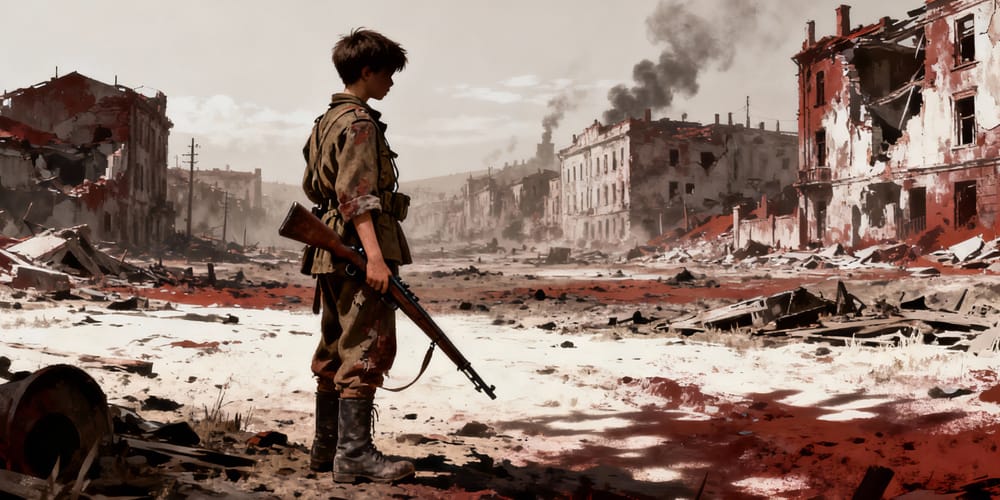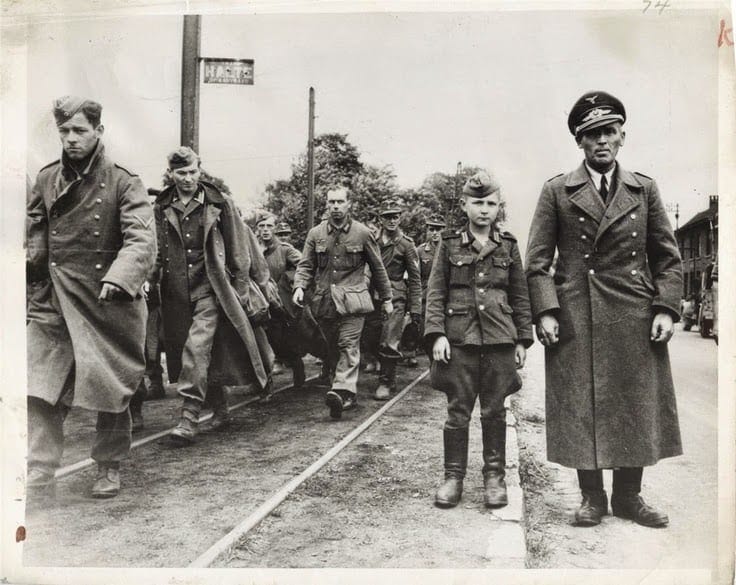2025: Year 9 & 10 Category: Winner
No Right, Only Wrong
by Katelyn Olakkengil, Lyneham High School

George Maher: Germany, Age 13
In 1915, I lied to my country.
I told the German recruitment officer I was sixteen. In truth, I was thirteen. It wasn’t hard; so many boys had done it before me. I practised deepening my voice and walked like the older boys. Maybe they believed me because they wanted to. Germany needed soldiers. Young ones, old ones, it didn’t matter. The Imperial German Army needed men, and boys could be made into men with a rifle and a uniform.
I believed every word of the propaganda. I memorised the slogans painted across Berlin’s walls: “Gott mit uns”, God is with us. I wanted to fight for the Kaiser, for the Fatherland, for glory. We were told it was our duty to protect the Fatherland.
My mother cried when I left. My father saluted me.
I joined the 79th Reserve Division. After basic training, I was sent west to Flanders. At first, I was proud. Proud to wear the uniform, proud to carry a rifle, proud to chant songs with the others. They told us we were heroes, destined to save our country from enemies who wanted to destroy us.
But then we reached the front.
By 1916, we were near Ypres. The trenches were hell on earth, mud-soaked, rat-infested, crawling with lice and the stench of death. Bodies lay half-buried in the walls of the trench. Our boots rotted from the water. Rats were crawling over the bodies of men who once laughed and sang beside me. The trenches weren’t a battlefield; they were a grave waiting to be filled.
Shells fell every night, shaking the earth like thunder. They called it Stellungskrieg, trench warfare. But there was nothing strategic about it. It was slaughter by inches.
At the Battle of the Somme, I saw what ‘glory’ really meant. We charged over the top into a wall of British Vickers machine-gun fire. Men fell like wheat. A friend of mine, Otto, tripped over barbed wire and was blown apart by a shell. His helmet landed beside me.
I picked it up.
The first time I saw a man die, I was frozen. He’d been shot in the chest. He grabbed at me, eyes wide, blood bubbling at his lips. He didn’t say anything, just stared at me like he wanted me to remember his face.
I did.
Every night, I started asking myself questions I never dared to voice: Are we the good ones? Are they really the enemy?
Because when I looked across No Man’s Land, I didn’t see monsters. I saw boys like me. Tired, scared, dying for reasons none of us understood.
John Condon: Austria-Hungary, Age 11
My brother died on the Eastern Front, fighting the Russians at the Battle of Galicia. I was nine then. He was a hero, at least that’s what they said. I wanted to be one too.
By 1916, I was eleven. I lied to the Austro-Hungarian authorities. Said I was fourteen. Said I wanted to serve. Too young, too small, too eager. But I begged them. They finally said yes. They didn’t look too closely. The empire was crumbling, and they needed runners. Boys like me: fast, unnoticed, and dispensable.
The uniform didn’t quite fit, and my boots rubbed my heels raw. But I felt important.
They sent me to the Italian Front first, near the Isonzo River. I saw the mountain passes of the Dolomites turned into cemeteries. Men froze to death at night and bled out in the snow by day. Then I was transferred west, toward Flanders, attached to an infantry unit helping support the German line.
That’s where I ended up, just a boy running messages between dugouts near Passchendaele in 1917. Running messages wasn’t just dangerous, it was terrifying. I dodged bullets, dove into shell holes, and crawled over bodies to deliver tiny slips of paper that meant life or death for others.
They said it was a critical push. They said we’d break through the British line. But all we did was drown.
The rain had turned the battlefield into a swamp. Men sank in the mud and never came out. Artillery craters filled with water. Horses, wagons, men, everything got stuck. Every step forward was a gamble.
I remember one run vividly. I was carrying an urgent message from the rear to the frontline near Polygon Wood. Bullets zipped by. Gas shells hissed in the air. My eyes burned. I clutched the message like it could save me.
That’s when I fell.
The Meeting: Somewhere Near the Front
My foot caught on barbed wire and I tumbled hard into the dirt.
That’s when I saw him. German, young, mud-covered. Rifle on his back. He froze when he saw me. I froze too.
“Don’t move,” I said in English, not knowing what else to say.
But he didn’t point his rifle. He didn’t yell. He just looked at me.
“You’re a child,” he stuttered, in broken English.
“So are you,” I voiced back.
We stared at each other in stunned silence.
Neither of us ran.
The front had gone strangely quiet as if the war was holding its breath.
He stepped forward. “You hurt?”
I nodded.
“Let me help you,” he offered. The boy bent down and unhooked the barbed wire from my ankle. He extended an arm out and helped me walk over to a spot.
We sat near a burnt tree stump, half in the mud. Far away, we could hear distant gunfire and the thud of mortars echoing across the plains.
“My name’s John Condon,” I said. “Austro-Hungarian army.”
“George Maher,” he replied. “German r-r-reserfe.”
We shared a scrap of stale bread from his coat pocket. I hadn’t eaten in hours.
“I thought we were the good guys,” I uttered, “when I joined.”
“So did I,” he whispered, “until I saw vhat ve did in Belgium. Vhat ze gas did at Ypres. Vhat I’fe done.”
A memory rose in my mind, wide-eyed, slipping into a shell crater. The mud swallowed him before I could reach him. I said nothing.
His jaw clenched. “Otto,” he muttered. “Sfenteen.” He didn’t need to say more. The Somme had taken him.
I realised then that we weren’t so different.
“What are we even fighting for?” I asked miserably.
George shook his head. “Empire. Lent. Power. Zings men care about. But ve’re ze vuns bleeding fur it.”
We sat quietly as flares lit up the sky. We could hear distant shouting. Somewhere nearby, a soldier was calling for his mother. Another screamed before falling silent.
“This war…” I began, but couldn’t finish.
George did. “It’s not about r-r-right or v-r-rong. It’s just v-r-rong.”
We looked at each other, two boys brought together by the same senseless suffering.
“I don’t want to fight anymore,” I whispered.
“Me neither.”
But we both knew we had no choice. We were caught in a war machine that didn’t care who we were, only what uniforms we wore.
We sat side by side, two children from different countries, wrapped in the same fear. We shared a piece of stale bread, and in that moment, there were no flags, no enemies, just two boys realising the same truth: There is no right side in war. Only loss.
And as the war roared around us, we held on to the one thing the world had tried to take from us: our humanity.
Eventually, George stood. “I should go. If zey find me here…”
“Me too,” I said, understanding all too well and rising slowly.
We didn’t hug. We didn’t shake hands. We just looked at each other.
“If ve efer meet again,” he said, “I hope it’s nicht like zis.”
“Me too.”
Then he turned and vanished into the mist.
I watched him go, a strange ache in my chest.
Epilogue: 1918
George Maher survived the war. He returned to a defeated Germany, its empire collapsed, its people starving. He never spoke of the war again, not for decades. But every night, he dreamed of Passchendaele.
John Condon did not survive. He died in the mud of Flanders in 1917, just weeks after meeting George. Artillery shell. No one ever found his body. They buried what was left in a mass grave.
He was twelve.
They say war makes boys into men. But that’s a lie.
War makes ghosts of children.
They never saw each other again. But in that brief moment behind the front line, they understood something most men never did: That war doesn’t care for right or wrong. It only cares for death.
Because in war, there is no right or wrong, just broken hearts, lost innocence, and the hope that someday, someone will choose peace instead.
Heartbreaking Photographs of Child Soldiers from WWI and WWII 2017, HistoryCollection.com, viewed 26 July 2025, <https://historycollection.com/heartbreaking-photographs-child-soldiers-wwi-wwii/>.
JUDGES’ COMMENTS
The judges agreed that this is an outstanding story, beautifully told from the perspective of youth, with a clear, well-developed theme and an original structure. It experimented successfully with a range of language features such as the layout, the attempt to recreate the German accent phonetically, the evocative title, and the use of imagery and contrast. It was well researched with chilling descriptions of the battlefield and a strong message of peace.
